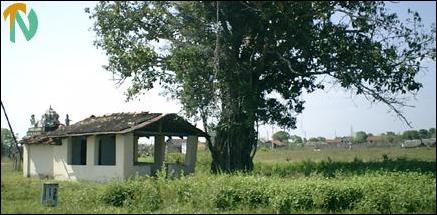
Resettlement should be about more than just politics
[TamilNet, Tuesday, 18 March 2003, 21:39 GMT]
While the attention of the peace talks and in the international community focuses on the internally displaced Tamils of the northern peninsula, the Tamils of the east, forced out by the Muslim Home Guards of the Sri Lanka Government have been forgotten. Residents of Tamil villages destroyed in the colonization of the east told TamilNet of their desire, and current inability, to return home.
The resettlement of the eight hundred thousand odd internally displaced people has featured prominently and consistently at the ongoing talks between the Sri Lankan government and the Liberation Tigers of Tamil Eelam. And, on this issue at least there appears to be consensus that steps ought to be taken to ensure that all displaced people are able to return to their former homes.
 |
|
4th Colony Central Camp- Vacant house of Tamils to be resettled.
|
It is a position that has been expressed by the American Deputy Secretary of State, Mr. Richard L. Armitage, who had this to say at a seminar held at the Center for Strategic and International Studies in Washington on February 14 this year “the Government of Sri Lanka must institute reforms that address the legitimate aspirations of the Tamil people. This means allowing Tamils the simple right to stay in their own homes and to pursue a living, such as fishing in coastal waters, without prejudice or harassment”
However, it appears that attention is primarily focused on the resettlement of the Muslims driven out of Jaffna and Tamils who fled into the Vanni in the wake of the Sri Lankan army’s occupation of the Jaffna Peninsula. Very little is said about the displacement of thousands of Tamils in the East whose displacement not only precedes the other much talked about displacements but has occurred consistently over a prolonged period. It was a process that set in motion deliberately by the Sri Lankan security forces ably assisted by Muslim Home Guards and politicians since 1990 and has continued almost unabated until the war ended in 2001.
 |
|
Punanai Muslim settlement around former Tamil village.
|
 |
|
Tamil section of Eravur awaiting development.
|
The Tamils of Ampara district suffered the most as it was from there several thousands of Tamils were evicted, having been subject to well planned atrocities designed to drive them out of their homes. The atrocities cited by analysts include massacres, destruction of homes & property and the disappearance of young Tamils taken into custody. All these acts were carried out during this period by Muslim Home guards, operating in tandem with the Special Task Force (STF) of the Sri Lankan Government.
 |
|
Thangavelauthapuram- The old school needing repair prior to resettlement.
|
The devastating effects of the forced displacements, disappearances and atrocities committed against the Tamil people are painfully plain to anyone who cares to take a cursory day trip to the east. The horrendous nature of these atrocities were brought home to many when 25,000 war widows gathered to remember their losses in Batticaloa International Women’s Day, March 8.
The displacement of Tamils in Ampara has been compounded by the forced acquisition of property by unscrupulous Muslim businessmen who have either taken over Tamil property by paying monies far below market prices or moved into villages abandoned by Tamils, say residents. It is estimated that well over twenty Tamil villages have been taken over in the Ampara district as a direct outcome of the terror tactics carried out by the STF and the Muslim Home Guards.
The ‘take over’ of the villages has more often than not been accompanied by either the destruction of Hindu temples or the building of mosques in such villages to impose Muslim ‘ownership’, say the villagers.
 |
|
Murugappa Thangarasa (74) from the village of Thangavelauthapuram.
|
The impassioned plea by seventy four year old Murugappa Thangarasa said it all. Thangarasa’s displacement from the village of Thangavelauthapuram was preceded by the disappearance of young Tamils taken into custody, atrocities, harassments and indiscriminate shelling. Soon the entire village abandoned their homes. Despite his steadfast resolve to stay in his village home, Thangarasa was forced to leave. With the advent of ‘peace’ he is anxious to resettle in his own village, but there is little progress to date to make this happen.
Displaced Tamils in the East need to return just as much as the displaced Tamils and Muslims of the Jaffna peninsula. Unless this becomes an integral part of the resettlement program, the much touted ‘normalcy’ is likely to remain a cynical exercise in politics, say analysts. The Ampara Tamils, unlike the Jaffna Peninsula Tamils or the Muslims, have no champions to press their cause and it would appear they are destined to remain destitute in the land of their birth, say the residents.
“It is time that action is taken so we, along with other displaced Tamils, can return to our homes and regain what is rightfully ours,” a resident told TamilNet. “It is time that the question of resettlement is handled not only as an exercise in politics but with justice for all.”















